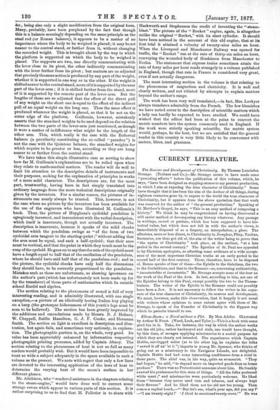CURRENT LITERATURE.
The Sources and Development of Christianity. By Thomas Lamisden Strange. (Thibner and Co.)—Mr. Strange seems to have made some "preceding efforts" before the publication of this volume, which, he says, "have been designed as stepping-stones to my present production, in which I aim at exposing the true character of Christianity." Some have thought that it has been the aim of the Author of all things, during eighteen centuries gone by, to expose to the world the true character of Christianity, but it appears from the above quotation that that work was reserved for the author of "the present production." Speaking of St. Matthew's Gospel, he says, "This is an easy method of composing a history." We think he may be congratulated on having discovered a still easier method of decomposing any history whatever. Any passage in writings, sacred or profane, which has been supposed to have his- torical value, but which does not fall in with the author's views, is immediately disposed of as a forgery, an interpolation, a gloss. The allusions, more or less direct, to Christianity in Josephus, Pliny, Tacitus, Suetonius, are thus got rid of, the aim of the writer being to prove that "the uprise of Christianity" took place, at the earliest, "at a late period in the second century." The Epistles of St. Paul are appealed to by Christian apologists, as affording some evidence of a wide accept- ance of the most important Christian truths at an early period in the second half of the first century. These, therefore, have to be disposed of. Ronan speaks of four of these—the Epistle to the Galatians, the two to the Corinthians, and that to the Romans—as, concerning authenticity, "incontestables et incontestehs." Mr. Strange accepts none of the fonr as the work of the Paul of the Acts. In fact, according to him, not one of the Epistles belong to this Paul, except possibly the two to the Theses- Ionians. The writer of the Epistle to the Romans could not possibly have been a Jew. It is not necessary to follow the writer in his expo- sure of the true character of Christianity, its sources and development. We must, however, make this observation, that it happily is not usual with writers whose opinions to some extent agree with those of Mr. Strange, to speak of the Founder of Christianity in the flippant way which he permits himself to use.


































 Previous page
Previous page